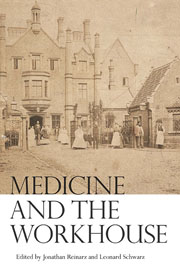Book contents
- Frontmatter
- Contents
- Preface
- Introduction
- Part One The Old Poor Law
- 1 Contagion, Exclusion, and the Unique Medical World of the Eighteenth-Century Workhouse: London Infirmaries in Their Widest Relief
- 2 The Elderly in the Eighteenth-Century Workhouse
- 3 “These ANTE-CHAMBERS OF THE GRAVE”? Mortality, Medicine, and the Workhouse in Georgian London, 1725–1824
- 4 Workhouse Medical Care from Working-Class Autobiographies, 1750–1834
- 5 “A Sad Spectacle of Hopeless Mental Degradation”: The Management of the Insane in West Midlands Workhouses, 1815–60
- Part Two The New Poor Law
- Selected Bibliography
- List of Contributors
- Index
2 - The Elderly in the Eighteenth-Century Workhouse
from Part One - The Old Poor Law
Published online by Cambridge University Press: 05 December 2013
- Frontmatter
- Contents
- Preface
- Introduction
- Part One The Old Poor Law
- 1 Contagion, Exclusion, and the Unique Medical World of the Eighteenth-Century Workhouse: London Infirmaries in Their Widest Relief
- 2 The Elderly in the Eighteenth-Century Workhouse
- 3 “These ANTE-CHAMBERS OF THE GRAVE”? Mortality, Medicine, and the Workhouse in Georgian London, 1725–1824
- 4 Workhouse Medical Care from Working-Class Autobiographies, 1750–1834
- 5 “A Sad Spectacle of Hopeless Mental Degradation”: The Management of the Insane in West Midlands Workhouses, 1815–60
- Part Two The New Poor Law
- Selected Bibliography
- List of Contributors
- Index
Summary
In the late nineteenth century, a photograph was taken at two of London's largest workhouses. Each shows the inmates gathered to eat a meal; one is of women, the other of men. Row after row of grim-faced, uniformed elders sit despondent before identical plates of food. The images are hauntingly stark and filled with despair, and they compel the question of how British society came to adopt institutionalization of the elderly poor. But in their power to unsettle the viewer, the images also reveal the tendency of contemporaries and historians to privilege emotional responses and the historical memory of the workhouse and thus remind us of the need to examine the actual historical uses and experiences of these institutions.
Workhouses never housed more than a small proportion of the elderly of Great Britain, and conditions inside them were more often filled with tedium than abuse. Nonetheless, they were ubiquitous from the eighteenth century, and the potential of ending up in a workhouse was a very real possibility for the parish poor. Such an end not only violated personal desires for autonomy but also went against the grain of fundamental ideals of community and familial support for the aged that were deeply embedded in culture and society. Moreover, the eighteenth century was a time of increased concern for individual rights, the start of the rise of modern notions of the self, and an era that abounded with cries for human freedom.
- Type
- Chapter
- Information
- Medicine and the Workhouse , pp. 40 - 57Publisher: Boydell & BrewerPrint publication year: 2013



